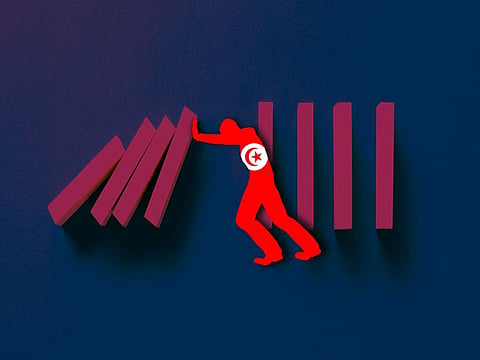How Tunisia can regain its lustre
To be seen as a viable partner, the country must first sort out its self-made crises

What happened to Tunisia? The country is mired in political limbo.
After 2011, when President Zine El Abidine Ben Ali’s government fell, Tunisians thought the West’s cheering — not to mention its material assistance — would last forever.
It became a case of mutual disappointment. While Tunisians were hoping their EU partners would have enough imagination to go beyond the type of support usually associated with European Neighborhood Policy programs, Europe and the United States were expecting Tunisia to forge ahead with political and economic reforms. It did not.
For more than a decade, wariness about social upheaval hindered economic reforms in Tunisia.
Tunis’ worst fears of abandonment were confirmed in December, when the International Monetary Fund decided to indefinitely postpone discussion of a $1.9 billion loan package that was supposed to help meet Tunisia’s budget needs and open the door to additional loans.
Today, Tunisia haplessly waits for the IMF to reschedule its executive board meeting and for foreign donors to come through.
Many blamed Tunisia’s inept diplomatic lobbying and its lack of clear commitment to economic change for the reluctance of partners to step in. The just-announced change at the helm of the foreign ministry provided some hope that the country’s diplomacy could be starting to shed some of its lethargic demeanour.
World Bank vice president for MENA, Ferid Belhaj, tried to reassure Tunisians recently that foreign donors might still come forward.
While Tunisian authorities often seemed tempted to deny that a crisis even existed, Western nations have been focused on their own concerns — especially the Ukraine war and related defence spending and energy plans. Any money that’s going to Tunisia today is being allocated for emergency needs, not long-term programmes.
Europeans and Americans maintained a wait-and-see attitude toward Tunisia’s stuttering process. Although Washington hasn’t halted foreign assistance — nor has it vetoed the IMF loan — US policymakers have signalled their intent to slash economic and military assistance.
The US may also suspend a $500 million Millennium Challenge Corporation grant for an infrastructure project, out of concern for what it sees as Tunisia’s democratic backsliding.
US Senator Chris Murphy, a member of the US Senate Foreign Relations Committee, said last month: “I do not believe the United States should provide the Tunisian government with additional support until there is a significant democratic course correction in the country.”
The West’s quandary is fuelled by Tunisia’s fuzzy political outlook, which is compounded by the opposition’s divided ranks and the Tunisian public’s political indifference, as demonstrated by the 11 per cent voter turnout in recent parliamentary elections.
As American academic Daniel Brumberg pertinently noted: “The number one obstacle to democracy in Tunisia is the overwhelming estrangement of everyday Tunisians from any idea of formal politics, and from a widely despised political elite.”
It may be easy for Tunisia’s populists to redraw the map of their country’s alliances, but geopolitical realities are stubborn.
Tunisia’s geostrategic value
For the West, the lustre of Tunisia’s democratic experience may have faded but not its geostrategic value. The location of Tunisia in the middle of the Mediterranean underpins the resilience of the country’s ties to Europe and the US.
However, there’s no escaping the presumption that the future of Western attitudes toward Tunisia will likely hinge on its leaders’ ability to convince their interlocutors of their commitment to democracy and economic reforms.
Barring that, Tunisia’s options are quite limited. The country has turned to its immediate neighbours, with mixed results. Tunis, which depends on energy supplies from Algeria, has received crucial credits from its neighbour including a $300 million loan in December.
But in turning to their region, Tunisians are torn between awareness of their country’s dire needs and their acute sense of pride.
There is a perception mong many Tunisians that the West’s only interest in their country is in preventing havoc from spilling over into Europe — particularly in the form of illegal migration.
Ultimately, it’s up to Tunisians to prove that their country matters to them. That will not happen through unbridled emigration and indifference to public life.
For Tunisia to regain its international radiance, it must first sort out its mostly self-made crises. Only then, will it be seen as a viable partner and not just as a country seeking the good will of foreign donors.
Oussama Romdhani is an editor. He previously served in the Tunisian government and as a diplomat in Washington, D.C.
Syndication Bureau



